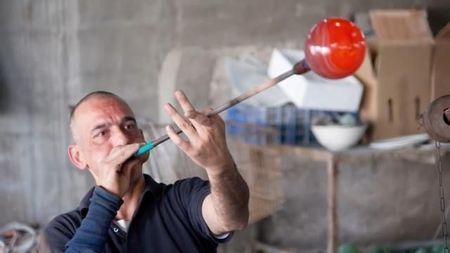Hebron glass was traditionally produced using sand from the village of Bani Na'im, east of Hebron, and sodium carbonate taken from the Dead Sea. Instead of sand, recycled glass is the primary raw material used to make Hebron glass today.In the 19th hundred, it was reported that Arabs cut and burned Salicornia fruticosa (syn. Arthrocnemium fruticosum), growing by the Dead Sea, and afterwards sold the ashes to the glass-makes of Hebron.The precise production process is a trade secret maintained by the few Palestinian families who run the factories which continue to produce Hebron glass today,passed through generations by apprenticing children. As one master of the craft said, "You can learn to play the 'oud at any age, but unless you begin [glasswork] as a child, you will never become a master.According to the Holy Land Handicraft Cooperative Society, the blowing technique employed is the same as was used by the ancient Phoenicians, though archaeologists and historians of glass agree that glassblowing was not common until the last few centuries BCE. Molten glass is withdrawn from a furnace on the end of an iron pipe, which is blown into as a metal tool called a "kammasha" is used to shape the glass. It is returned to the furnace and reshaped by the same process before being detached from the pipe and placed into a cooling chamber.
Country / Region
Palestine
Province
West Bank
Business Type
Manufacturer
Main Products
Phoenician Glass, Ceramic, Olive Wood Products, Genuine Leather Products, Hand Made Products
Year Established
2020
Employees
5 - 10 People
Turnover One Year
US$1 Million - US$2.5 Million
Main Markets
North America: 60%
Western Europe: 15%
Mid East: 9%
